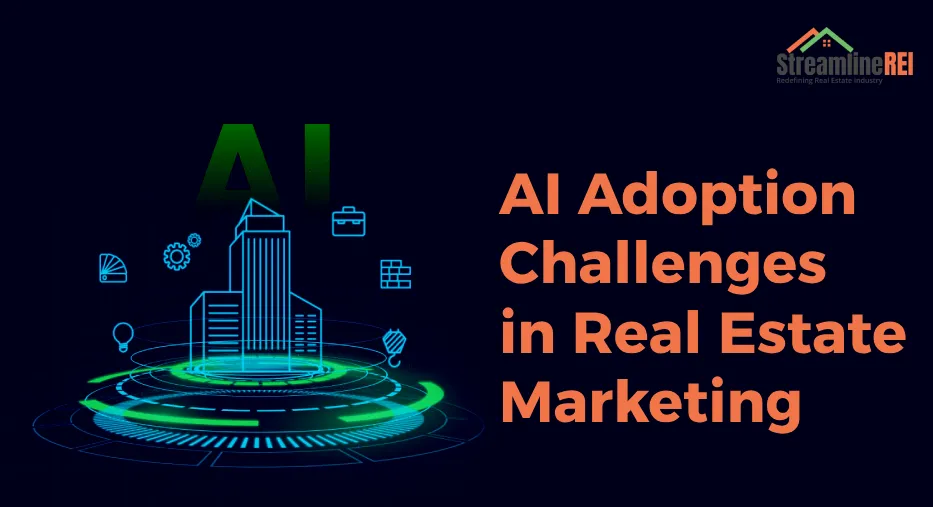Home / Blogs

Picture yourself as a real estate agent. Your day is packed. You’re setting home prices, finding buyers, and answering tons of questions. It’s hard work! Now, imagine a helper who never sleeps. This helper can dig through piles of info fast and even chat with clients when you’re busy. That’s what Artificial Intelligence (AI) brings to real estate marketing.
AI is a clever computer tool. It thinks and learns a bit like a person. In real estate, it’s a game-changer. AI tools can guess home prices by checking nearby sales. They also find buyers by matching them to homes they’ll love and using chatbots to answer things like, “How big is the backyard?”
According to the Deloitte 2025 report, up to 52% of real estate firms are testing AI. But only 18% use it entirely. Why the gap? Challenges slow things down. This blog tackles those hurdles in AI adoption in property marketing. We’ll show you how to jump over them.
Adopting AI sounds cool, right? But it’s not always smooth. Let’s break down the significant barriers to AI adoption in property marketing.
AI needs information to work, such as names, addresses, or money details from buyers and sellers. This info is private. Keeping it safe is a must. If it leaks, trouble hits. Hackers could grab it. Clients might stop trusting you.
Real-life example: Did you know that? In 2024, a big agency got fined $2 million. Why? Their AI tool didn’t lock up client data tightly enough. That’s a lesson!
AI is only as smart as the info it gets. Bad info? Bad results. Think of a home listed with four bedrooms when it has three. AI might price it wrong. Buyers walk away confused.
Old sales numbers or missing buyer details are like having kids, and they mess things up too. Good data is gold for managing real estate data for AI systems.

AI tools can cost a lot. Small agencies feel the pinch. It’s not just buying them. You pay to set them up, train your team, and keep them running. According to the 2025 NAR survey, almost 60% of small firms skip AI. The price tag scares them off.
Most real estate folks know homes, not tech. AI feels tricky. They worry it’s too hard to learn. Without developing AI skills in real estate marketing, it’s tough to start. A study by Zillow found that 45% of agents fear tech changes.
AI must play fair. It can’t pick buyers based on things like race or age. That’s wrong and against the law. Plus, rules like the Fair Housing Act are over regulations affecting AI in property marketing. Breaking them? Big fines.
Got the challenges? Now, let’s fix them. Here’s how to tackle overcoming AI implementation challenges in real estate.
StreamlineREI offers cutting-edge AI solutions for real estate marketing. Visit them to learn more.
Example: A small firm in Texas cut costs by 30% in 2025 using free AI trials. Sales jumped 15%.
What tools rock for AI adoption in real estate marketing? Here’s a peek:
In 2025, 70% of top agents use these, according to Realtor.com.
What’s next for the future of AI in real estate marketing? Big stuff! Check these emerging AI trends in real estate marketing.
But watch out. New tech means new puzzles. Keep learning to stay ahead.
AI can change real estate marketing forever. It speeds things up and sharpens your edge. But real estate AI integration hurdles like privacy, costs, and skills slow it down. Fix them with our tips. Balance tech with that human touch clients crave.
“AI lifts us up, not out,” says Mark Lee, a broker at Horizon Realty. That’s the truth. With AI’s impact on real estate marketing strategies, you’ll shine in 2025 and beyond.
Ready to dive in? StreamlineREI can help you. Contact us today!
AI helps price homes, find buyers, and chat with clients using smart tools.
AI uses personal info. Keeping it safe stops leaks and builds trust.
Use free tools, train your team, and follow laws to make it easy.
Yes, but free trials and cheap options help with the cost of AI tools for real estate marketing.